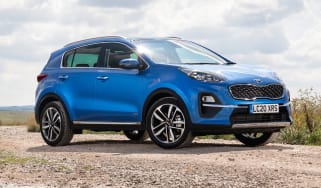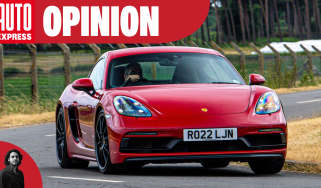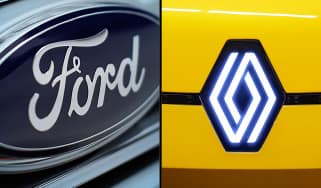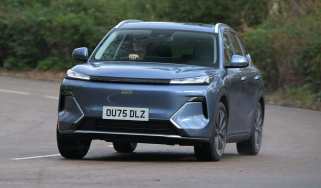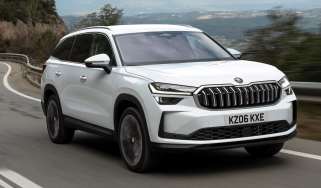What is a PCP? Personal Contract Purchase car finance deals explained
PCP car finance deals are a popular way of buying cars because they can be very flexible. Here’s how they work…

Personal Contract Purchase, also known as PCP, is a popular and flexible way of financing and paying for a new car, often with lower monthly payments when compared to Hire Purchase (HP) or a personal loan.
According to the Finance and Leasing Association, over 80 per cent of new cars were purchased using car finance in the twelve months up to August 2024. Of that, PCP deals accounted for around 83 per cent of all new car sales during this period.
With the benefits of low monthly payments and flexibility around mileage, term length and what to do at the end of the deal, PCP deals offer a good way of getting behind the wheel of a new car.
Before you get into the nitty gritty details of Personal Contract Purchase car finance deals, it’s important to note that at the end of a PCP agreement, you won’t actually have to own the car, although there is the option to do so.
Before signing on the dotted line and handing over the deposit for a shiny new car through a Personal Contract Purchase finance deal, it's worth understanding how PCP works, and how it differs from Hire Purchase (HP), Conditional Sales (CS), or leasing.

What is a PCP car finance agreement?
PCP or Personal Contract Purchase car finance agreements consist of three main parts. Once you’ve chosen how long you would like the contract to last, the dealer will explain each of them in detail before you sign up to the agreement.
The initial deposit
The initial deposit is how much money is put down at the start of the contract and is typically around 10 per cent of the car’s value, although this can be negotiated.
A dealer or manufacturer might make an additional contribution on top of your own deposit. The more money you can afford to put down as an initial deposit, the lower your monthly payments will be.
Monthly payments
The monthly payment is fairly self-explanatory. You’ll find that most PCP agreements are either 36 or 48 months in length, and this is the amount you will pay every month for the duration of your agreement.
Final payment
Once you reach the end of the contract, you’re faced with a choice between giving the car back, subject to extra charges for any damage or excess mileage, or keeping it permanently.
If you wish to keep your car, you will have to make a final payment, also known as a ‘balloon payment’ to cover the rest of the vehicle’s value.
The final payment amount is decided by the finance company and is based on an estimate of the car’s value at the end of the contract period. This is also referred to as the Guaranteed Minimum Future Value (GMFV), but more on that later.

What are the advantages and disadvantages of a PCP car finance deal?
Like all types of credit, it’s beneficial to understand the advantages and disadvantages of using PCP. Flexible terms and the guarantee of a car’s value at the end of the deal are appealing, but you have to ensure that you fully understand any hidden fees.
Advantages of PCP deals
With a PCP deal, customers will often find themselves paying less per month than they would on an equivalent Hire Purchase or Conditional Sale contract, for example. Many manufacturers can also work in servicing plans, extended warranty or GAP insurance into the monthly payments, so you might not need to worry about a large bill when it’s time to service the car.
At the end of the PCP agreement, you can simply hand the keys back and use the difference between the Guaranteed Minimum Future Value and the final balloon payment as part of the deposit towards a shiny new car. If you want to keep your car, however, you can simply tell your finance provider and pay the final balloon payment.
If you know you’ll want to take ownership of the car at the end of the term, PCP agreements will often prove more expensive than hire purchase finance deals, but if you want to hand the car back or trade in for an all new model, as most PCP customers do, it's a good option.
A PCP agreement can also be a good way of owning a car for a short term, then if your circumstances change, you don't have to worry about the financial burden any more once you've handed the car back. Just remember that you won't have the car as an extra bargaining chip when it comes to arranging a deposit on your next car.
Disadvantages of PCP car finance deals
While PCP agreements typically have lower interest rates, lower monthly payments and more flexible terms when compared to HP or CS deals, make sure you read the small print and potential penalty costs.
At the end of a PCP agreement, if you return the car with any damage you will be charged for the cost of any repairs. You’ll also be charged extra for every mile above the pre-agreed annual mileage cap, which could be quite expensive if you have gone over the cap.
It’s also worth noting that if you’ve had a bad experience with a car or manufacturer and choose to walk away at the end of the agreement, you can’t take any positive equity or money built up and spend it elsewhere.
If you do walk away, that's it – no car, no cash back, but at least you don't have to cover the final balloon payment. Once the monthly payments stop, that's it, you're back to square one.
Bearing this in mind, it may sometimes be cheaper to take out a hire purchase agreement instead, or a personal bank loan, especially if you decide that you want to keep the vehicle at the end of the agreement.
Ultimately, you need to decide what the car’s going to be used for, what you can afford and whether you’re likely to want to have a new model at the end of the agreement, or stick with what you’ve got.
PCP APR interest rates
Most PCP deals will have a fixed rate of interest attached to the finance agreement and this typically starts from around 4.0 per cent, but you need to look for the APR (annual percentage rate) as this will include all interest and changes you’ll be paying.
Depending on the make and model of the car you’re looking to buy and where you plan on buying it from, the APR interest rate you pay can vary wildly. Manufacturer finance providers typically keep their interest rates low as a way to entice car buyers, where independent garages and finance brokers generally have higher rates.
Some manufacturers can offer zero per cent finance on a brand-new car, which means you’ll be paying back what you borrow with no interest added.
APR legally has to be stated in a finance agreement, so if you can’t find this information then just ask for it.
Beware of ‘representative’ APR
When you find a car or PCP deal that you like the look of, keep in mind that you might not get the advertised interest rate, depending on your credit score and affordability.
In order to easily compare deals, finance providers use ‘representative’ APR interest rates. This is the rate given to 51 per cent of successful PCP applications, so chances are you might end up paying a much higher rate of interest, and therefore have a higher monthly payment.
So while a car might be advertised with an APR interest rate of 5.0 per cent, once you’ve been through the credit and affordability checks, you might be given an interest rate of 15.9 per cent. Most providers should be able to provide you with an eligibility calculator before you put in an application to see your acceptance odds first.
How PCP car finance agreements differ from Hire Purchase or Conditional Sale agreements
PCP deals, HP or Conditional Sale agreements are all great ways of financing a new car, but they all have differences which will suit different buyers.
A PCP finance deal will see buyers paying monthly instalments that cover part of the cost of a new car, usually around a third of the list price or the amount the car is expected to depreciate by, which means that these monthly payments will be lower than Hire Purchase or Conditional Sale. HP or CS agreements are calculated so you’ll pay back the full amount you borrow, plus interest.
If you'd like to own the car at the end of the PCP, then you’ll need to stump up a substantial final payment, the Guaranteed Minimum Future Value (GMFV) payment, to take the keys. This is where PCP differs from Conditional Sales or Hire Purchase agreements, as HP or CS won’t require such a hefty final payment, so if you're looking to buy a car to keep for the long term, then a PCP probably isn't the right kind of finance for you.
If you’re buying a car via Hire Purchase or Conditional Sale, you’ll probably be planning on keeping the car at the end of the agreement. This means that you won’t need to worry too much if you go beyond the agreed mileage. We’ve got a dedicated page which looks at Hire Purchase car finance agreements in more detail.
However, if you must have the latest car to keep up with the neighbours, then a PCP can make a lot of sense. You'll have a brand-new car on your driveway every three years or so, and because you're not buying outright, you can get a bit more car for your money than you'd be able to get by taking out a conventional loan. A canny PCP provider will do everything they can to ensure that your car’s value at the end of the PCP term will be a little higher than the GMFV payment required to buy it outright.
This difference between the balloon payment and the car's value can then be used to help reduce the deposit you will pay on the next car the dealer will line up for you when the current PCP runs out.
What is Guaranteed Minimum Future Value (GMFV)?
When you set up a PCP deal, the dealer will give you a 'Guaranteed Minimum Future Value' for the car. The GMFV is the minimum amount the car will be worth at the end of the agreement. So if the car unexpectedly drops in value, you'll be protected. And if the car happens to be worth more than the GMFV at the end of the PCP, you can use the equity as a deposit in your next deal.
If the car is worth more than the GMFV, you can use any excess payments you have made towards its depreciation to reduce the deposit on a new vehicle. If the car is worth less, it’s the lender’s problem, you can simply hand it back.

Are there any risks involved in PCP car purchases?
The inherent risk of any form of finance purchase is that, after signing up to it, you may experience a change in personal circumstances – such as loss of employment – that means you can no longer afford to make your payments.
Fortunately, the Financial Conduct Authority requires that finance providers be fair to customers in this scenario. If you are struggling to make your payments, therefore, the best thing to do is to contact your finance provider and discuss the best way to move forward with them.
Manufacturers push PCP, so interest rates are often low, but they also set mileage limits with an excess mileage charge applied if you exceed them, usually at a pence-per-mile rate. What's more, you'll need to maintain the car in accordance with the manufacturer’s service schedule. While that's good practice anyway, if the car is damaged and you return it at the end of the PCP deal, the dealer can mark down its value.
Click the links below to get full guides on each of the key car finance options or find out how much your car is worth with our free valuation tool…





